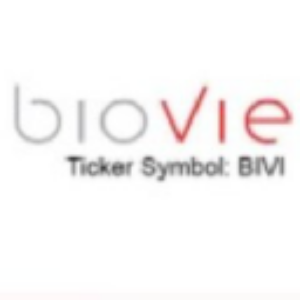BioVie Presents Data Showing How NE3107 May Potentially Regulate DNA Methylation of Specific Genes in a Manner Highly Correlated to Observed Improvements in Cognition and Biomarkers of Disease
- Treatment with NE3107 led to >
50% reductions in DNA methylation of 400 CpGs* and some in a manner that was significantly correlated to observed clinical improvements in cognition and various biomarkers. - Over 3,000 significant correlations were found linking reductions in DNA methylation of various CpGs and cognitive, biomarker and neuroimaging endpoints.
CARSON CITY, Nev., July 17, 2023 (GLOBE NEWSWIRE) -- BioVie Inc., (NASDAQ: BIVI) (“BioVie” or the “Company”), a clinical-stage company developing innovative drug therapies for the treatment of neurological and neurodegenerative disorders and advanced liver disease, today announced data from a poster detailing the epigenetic basis for how in a Phase 2 exploratory biomarker study its drug candidate NE3107 may have potentially regulated specific genes in a manner significantly correlated with observed cognitive and biomarker improvements. The poster was presented yesterday at the Alzheimer’s Associate’s International Conference (AAIC) held in Amsterdam July 16-20, 2023.
In the poster presentation, titled Treatment-Induced Epigenetic Modifications in MCI and Probable Alzheimer’s (Reading C, et al.), our presenters showed how patients with clinical dementia treated with NE3107 for 3 months saw >
1) 14 CpGs related to anti-inflammatory genes (including IL6, IL10, and also LRRFIP1 whose protein product represses TNFα expression1) that are significantly correlated with reduction in plasma TNFα levels, which is considered to the master regulator of inflammation.
2) 43 CpGs related to antioxidant genes (including those encoding glutathione and thioredoxin enzymes) which are significantly correlated with increases in precuneus glutathione levels from magnetic resonance spectroscopy (MRS) of the brain. Decreased glutathione levels have been shown to be associated with cognitive decline.2
3) Numerous CpGs associated with genes related to insulin signaling and antioxidant responses were significantly correlated with volumetric changes in the hippocampus, subcortical grey matter, as well as frontal, temporal, parietal, and occipital lobes. Volumetric changes in the brain have been associated with alterations in cognitive function in patients with MCI and dementia.3
4) Numerous CpGs associated with insulin signaling, antioxidants, anti-inflammatory, anti-apoptotic, anti-amyloid, and neurostimulation were significantly correlated to improvements in cognition and traditional biomarkers of AD. In total, nearly 500 significant correlations were found between all the CpGs and cognitive assessments (including ADAS-Cog11, CDR, ADCOMS, etc.) and over 300 significant correlations between CpGs and AD Biomarkers (Tau, p-Tau, p-Tau/Aβ42, Aβ42).
In total, over 3,000 statistically significant correlations were found to exist between reductions in DNAm of various CpGs and cognitive, biomarker and neuroimaging endpoints in our trial.
Inflammation has been shown to be associated with the hypermethylation of DNA,4 which in turn has been shown to impact a wide range of diseases, including various forms of cancers,5 age-related cognitive impairment and dementia,6 Parkinson’s disease,7 cardiovascular disease,6,8 COPD and respiratory disease,9 chronic kidney disease,10 inflammatory bowel disease,11 sepsis,12 and many others. The new data that was presented details how NE3107 may potentially change or affect the degree of methylation of specific genes that are correlated with various markers of disease.
“Taken in its totality, we believe the data suggests that NE3107 may have the potential to trigger epigenetic changes that could potentially reduce inflammation and oxidative stress, restore homeostatic regulation and enable the recovery of gene expression that may then improve neuronal health, and thus potentially improve the clinical measures of MCI and AD,” commented Cuong Do, President and CEO of BioVie. “We believe that NE3107 treatment-associated changes may be indicative of potential broad and multisystemic regulatory activities within mechanisms associated with the diagnosis and progression of cognitive disorders, MCI, and dementia.”13,14
* Sites on DNA strands where cytosine is next to guanine, which is the location where DNA can be “methylated.”
About Inflammation and NE3107’s Potential Mechanism of Action
Neuroinflammation, insulin resistance, and oxidative stress are common features in the major neurodegenerative diseases, including Alzheimer’s Disease (AD), Parkinson’s Disease (PD), frontotemporal lobar dementia, and ALS. NE3107 is an oral small molecule, which is blood-brain permeable, with ERK-binding properties that may allow it to selectively inhibit ERK-, NFκB- and TNF-stimulated inflammation and insulin resistance. NE3107’s potential to inhibit neuroinflammation and insulin resistance forms the basis for the Company’s work testing the molecule in AD and PD patients.
Remarkable parallels exist between AD and PD, among them activated microglia driving inflammation, involvement of TNFα, oxidative stress, protein misfolding, mitochondrial dysfunction, and insulin resistance. In preclinical and clinical studies, NE3107 reduced inflammation and enhanced insulin sensitivity, both of which are important to PD pathology. Preclinical studies in marmoset monkeys have shown NE3107 administered alone to be as pro-motoric as levodopa, underscoring the apparently critical role of inflammation in expression of PD motoric symptoms. When NE3107 was administered with levodopa, the combination improved motor control better than either drug alone. Furthermore, in the marmoset study, NE3107 reduced the severity of levodopa induced dyskinesia (LID) concurrent with pro-motoric benefit and decreased neurodegeneration, preserving twice as many dopaminergic neurons compared to control.
About BioVie
BioVie Inc. (NASDAQ: BIVI) is a clinical-stage company developing innovative drug therapies for the treatment of neurological and neurodegenerative disorders and advanced liver disease. In neurodegenerative disease, the Company’s drug candidate NE3107 inhibits inflammatory activation of ERK and NFkB (e.g., TNF signaling) that leads to neuroinflammation and insulin resistance, but not their homeostatic functions (e.g., insulin signaling and neuron growth and survival). Both are drivers of Alzheimer’s and Parkinson’s diseases. The Company is conducting a potentially pivotal Phase 3 randomized, double-blind, placebo-controlled, parallel-group, multicenter study to evaluate NE3107 in patients who have mild to moderate probable Alzheimer's disease (NCT04669028). Results of a Phase 2 investigator-initiated trial (NCT05227820) showing NE3107-treated patients experienced improved cognition and biomarker levels were presented at the Clinical Trial in Alzheimer’s Disease (CTAD) annual conference in December 2022. An estimated six million Americans suffer from Alzheimer’s. A Phase 2 study of NE3107 in Parkinson’s disease (NCT05083260) has completed, and data presented at the International Conference on Alzheimer's and Parkinson's Disease and Related Neurological Disorders conference in Gothenburg, Sweden in March 2023 showed significant improvements in “morning on” symptoms and clinically meaningful improvement in motor control in patients treated with a combination of NE3107 and levodopa vs. patients treated with levodopa alone, and no drug-related adverse events. In liver disease, the Company’s Orphan drug candidate BIV201 (continuous infusion terlipressin), with FDA Fast Track status, is being evaluated in a US Phase 2b study for the treatment of refractory ascites due to liver cirrhosis. BIV201 is administered as a patent-pending liquid formulation. The active agent is approved in the U.S. and in about 40 countries for related complications of advanced liver cirrhosis. For more information, visit http://www.bioviepharma.com/.
Forward-Looking Statements
This press release contains forward-looking statements, including statements regarding the Company’s strategy, plans and objectives. Forward-looking statements may generally be identified by words such as "expect," "look forward to," "anticipate" "intend," "plan," "believe," "seek," "estimate," "will," "project" or words of similar meaning. Although BioVie Inc. believes such forward-looking statements are based on reasonable assumptions, it can give no assurance that its expectations will be attained. Actual results may vary materially from those expressed or implied by the statements herein due risks associated with conducting and completing clinical trials, including our reliance on third parties to conduct our clinical trials, to successfully defend potential future litigation, our ability to raise capital when needed on reasonable terms, changes in local or national economic conditions as well as various additional risks, many of which are now unknown and generally out of the Company's control, and which are detailed from time to time in reports filed by the Company with the SEC, including quarterly reports on Form 10-Q, reports on Form 8-K and annual reports on Form 10-K. BioVie Inc. does not undertake any duty to update any statements contained herein (including any forward-looking statements), except as required by law.
For Public/Press Relations Inquiries:
Contact:
Dennis Consorte
(201) 344-9648
dennisconsorte@gmail.com
For Investor Relations Inquiries:
Contact:
Bruce Mackle
Managing Director
LifeSci Advisors, LLC
bmackle@lifesciadvisors.com
1 Suriano AR Mol Cell Biol. 2005;25(20):9073-9081
2 Song T Ageing Res Rev. 2021;72:101503. doi:10.1016/j.arr.2021.101503
3 Talwar P Clin Neuroradiol. 2021;31(4):953-967
4 Stenvinkel P doi: 10.1111/j.1365-2796.2007.01777.x
5 Wang Z Nucleic Acids Research, 2020, Vol. 48, No. 5
6 Sugden K Neurology 2022;99:e1402-e1413
7 Tang X DOI: 10.1002/mds.29157
8 Tabaeia S Artificial Cells, Nanomedicine, and Biotechnology, 47:1, 2031-2041
9 Qiu W Am J Respir Crit Care Med Vol 185, Iss. 4, pp 373–381, Feb 15, 2012
10 Rysz C Int. J. Mol. Sci. 2022, 23(13), 7108
11 Kraiczy J Mucosal Immunology volume 9, pages 647–658 (2016)
12 Rump K Sci Rep 9, 18511 (2019)
13 Reading CL Mediators Inflamm. 2013;2013:814989. doi:10.1155/2013/814989
14 Jia T Mol Psychiatry. 2021;26(8):3884-3895.








